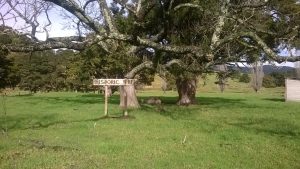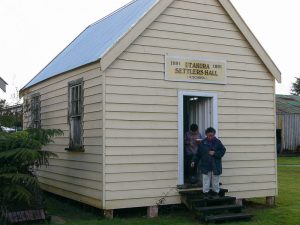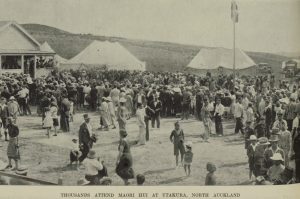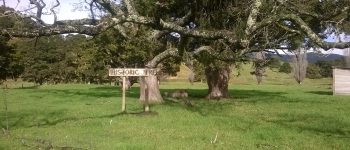1883: Utakura
June 10, 2019
By AHNZ
 Maori settlement of Utakura Valley goes way back in time to antiquity. The Utakura River leads down to the very handy navigable waterway of the Hokianga. In 1819 the famous missionaries Marsden and Kendall visited, returning again the following year¹. They had their work cut out for them converting these Nga Puhi people to peace. This was the same time period of the Great Expedition to Cook Strait where masses of Nga Puhi ravaged and ate their way through Auckland, Waikato, Taranaki, and Wellington.²
Maori settlement of Utakura Valley goes way back in time to antiquity. The Utakura River leads down to the very handy navigable waterway of the Hokianga. In 1819 the famous missionaries Marsden and Kendall visited, returning again the following year¹. They had their work cut out for them converting these Nga Puhi people to peace. This was the same time period of the Great Expedition to Cook Strait where masses of Nga Puhi ravaged and ate their way through Auckland, Waikato, Taranaki, and Wellington.²
 The Anglicans and Wesleyans divvied up the North Island, taking a side each. Being on the west coast, Utakura was claimed by the Wesleyan Christian sect and by the 1870s Utakura had its own Mission.³ Then, in 1883 the valley began to be cultivated by Settlers such as Joseph Gower.
The Anglicans and Wesleyans divvied up the North Island, taking a side each. Being on the west coast, Utakura was claimed by the Wesleyan Christian sect and by the 1870s Utakura had its own Mission.³ Then, in 1883 the valley began to be cultivated by Settlers such as Joseph Gower.
For a while, Utakai became a modern community based on fruit orchards, saw milling, and farming. They resisted floods, build their bridges and better roads, and this (see image) community hall and school in 1891. Gower provided a General Store and the settlement had its own post office until 1941.
I remember Utakura, guess, it’s running in my blood,
How our sleepy little river could become a raging flood;
How the schoolbus rattled crazily down Utakura Hill
Then sped across the water-course to give us kids a thrill – Utaka, Steve Herbert; Fast Fibres (2015); National Library NZ
About the time of this poet’s childhood little Utakura faded away as a settlement. No longer isolated, better roads drained such small towns and their community energy into amalgamations based around other centres. The old school building above was saved, re-located to Kaikohe. The remaining structure in the top image, I’m told, was the bicycle shed for the school. And the “historic tree” marking the site was planted in 1953 for the Queen’s Coronation.⁵
 So, that about satisfies my quest to answer this Ghost Settlement site that called me to stop and look last weekend. The only thing I’m leaving out is the remaining public building, the Utakura Marae. Their situation, as is typical, is to resent the Hobson Gang ever taking over New Zealand at all and to demand sovereignty under the flag of the Declaration of Independence (1835.) Once a big-shot centre of leadership (ref. 1939 image of Utakura hui attracting thousands) they’re now fighting over Government scraps. After talking and griping for over a decade even National 5.0 couldn’t organise a willing partner to extort taxpayer money, citing “useless leadership”…
So, that about satisfies my quest to answer this Ghost Settlement site that called me to stop and look last weekend. The only thing I’m leaving out is the remaining public building, the Utakura Marae. Their situation, as is typical, is to resent the Hobson Gang ever taking over New Zealand at all and to demand sovereignty under the flag of the Declaration of Independence (1835.) Once a big-shot centre of leadership (ref. 1939 image of Utakura hui attracting thousands) they’re now fighting over Government scraps. After talking and griping for over a decade even National 5.0 couldn’t organise a willing partner to extort taxpayer money, citing “useless leadership”…
The Crown will not be responding to the findings of the Waitangi Tribunal in its stage one report that Ngapuhi did not cede sovereignty. It comes at the final sitting of a ten year long hearing of claims of Te Paparahi o te Raki. – Hundreds meet to find way forward with Ngāpuhi’s stalled treaty negotiations, Newshub
Labour 5.0 will certainly try to get a conversion. While the Waitangi Tribunal endless talkfest has dragged on many leaders have actually died waiting. The internal squabble revolves around vesting grievance money into existing community groups vs creating a big central corporate entity trusted to administer and doll out the wealth. Meanwhile, the divided are kept in thrall as the steam goes out of their sovereignty quest.
—
1 An Encyclopaedia of New Zealand, McLintock (1966); Te Ara
2 Maori Wars of the Nineteenth Century, Smith (1910); Victoria Electronic Texts
3 Ref. Conservation Plan for the Mission House, Mangungu
4 Cyclopedia of New Zealand (1902); Victoria Electronic Texts
5 Old North Auckland; Facebook 2019
image ref. The Utakura Settlers Hall and School, Kaikohe Pioneer Village; Denis Wilford (May 2004)
image ref. Thousands Attend Maori Hui at Utakura; Auckland Libraries Heritage Collections
 Like Comment Share
Like Comment Share





